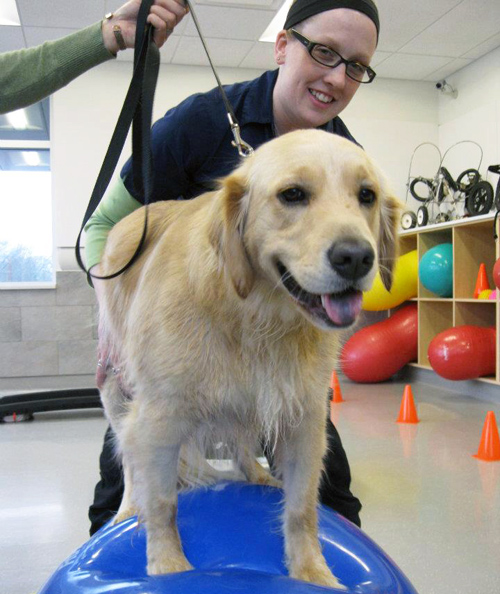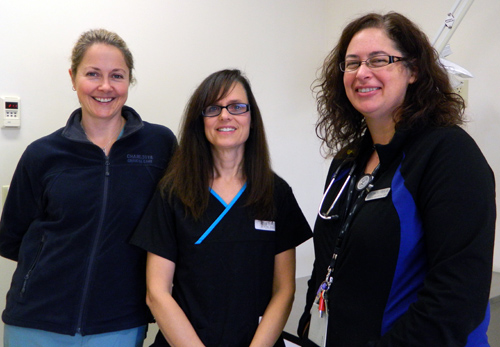
Veterinary technician Jennifer Panko remembers it as one of her most exciting cases. She’s the co-ordinator of rehabilitation at the Hill’s Pet Nutrition Primary Health Care Centre where most of her patients are dogs and cats – but on this occasion, she was working with something a lot bigger.
“I got an unexpected call from the Large Animal Clinic,” Panko says. “They had a bull calf who had had surgery but now wasn’t able to walk properly. He was intended to be a breeding bull and solving his mobility issues was crucial.” Some students who had seen Panko’s skills with smaller animals suggested calling her. She worked with the calf – on her own time – and was able to design a program of exercises that got him moving again. He went home healthy.
What do vet techs do? A lot more than most people think. Panko’s work with that calf is just one example of the contribution veterinary technicians make to the care and healing of the animals that come to OVC and to student education.
The vet techs at OVC write books and book chapters; speak internationally on animal care; organize conferences and symposia; teach students; inform and, when needed, comfort pet owners; co-ordinate schedules for staff and veterinarians; carry out medical treatments, including blood transfusions, mechanical ventilation and inserting catheters; provide rehabilitation exercises and treatments; co-ordinate clinic and service schedules; assess and triage animals arriving in emergency situations; and provide comfort and care to animals of many different species.
Their phones never stop ringing.
Andrea Steele, who works in the ICU connected to OVC’s Small Animal Clinic, is also the first Canadian president of the Academy of Veterinary Emergency and Critical Care Technicians. Her expertise has led to many invitations to speak at conferences and symposia and she teaches courses for veterinary technician students. But on this particular afternoon, she’s concerned about a dog in the ICU who isn’t doing well.

“I had thought about being a veterinarian all my life,” says Steele. “But when I got a job in a veterinary clinic, I saw that I really wanted to be a vet tech and have that hands-on work with animals.”
Steele is currently acting team leader in the ICU but more than half of her time is spent working directly with the often very ill animals in the ICU. “You need many special skills to work in that environment,” she says. “It’s very much a team effort – the technicians work closely with the residents and faculty.” The requirements mean that Steele, like many of her colleagues, has specialized in the nursing management of critically ill patients, such as those requiring ventilation, and peritoneal dialysis. “What we do, we do very well,” she adds.
Her colleague, Charlotte Donohoe, is the emergency referral co-ordinator; veterinarians contact her for help with emergency care situations. Her job involves patient assessments, which sometimes need to be done over the phone. That’s challenging, says Donohoe.
“Our referring veterinarians present case information over the phone. At times, it can be difficult to interpret the severity of an illness based on the details provided. From time to time, we offer treatment options to help stabilize the critical patients to increase their chances of arriving before succumbing to their illness.”
While managing that side of the issue, Donohoe also has to co-ordinate with the hospital services to see what is available. She keeps in touch with the referring veterinarians, letting them know the animal’s condition and the diagnostic plan. “Sometimes my role expands to include reassuring a distraught owner in our waiting area. I endeavour to use my ICU training and my communications skills to help our patients, their doctors and their owners’ experience a seamless visit at OVC.”
Donohoe is also the author of the book Fluid Therapy for Veterinary Technicians and Nurses and is another popular conference speaker (she was presented with the Speaker of the Year Award at the 2007 North American Veterinary Conference).
Panko arrived at the Primary Health Care Centre via a circuitous route. She spent three months in British Columbia, living in a van and rescuing and rehabilitating birds, harbour seals and other animals as an intern. After returning to Ontario and working in a small animal clinic and a mobile equine unit, she took a position with the Mississauga-Oakville emergency and referral hospital, where she was encouraged to get additional training in rehabilitation. Now she co-ordinates the rehab services at the Primary Health Care Centre, provides veterinary technician services and works at the Large Animal Clinic as well.
Veterinary technicians are also managers. In her role as co-ordinator of medical services at the veterinary hospital, vet tech Alison Downie works with faculty, residents, interns and up to eight students. “I’m often helping students with things like getting blood samples and giving medications,” she says. “When procedures are being done, I make sure everything is set up. I do a lot of client communications, helping people set up appointments and explaining what is happening. My job is to ensure everything goes smoothly.” She also keeps in touch with Donohoe so that she’s aware of new cases coming in.
Downie says that, like her colleagues, she got into this profession because she loved animals. “A lot of the animals I work with are here long term, so you get very attached to them and to their owners. People get to know me. I’ve even been asked to sit in with clients when their animals need to be euthanized, and I consider it a privilege and an honour. Yes, it is emotional at times but that’s because we care.”
Panko also says she often gets attached to the animals she works with. Just as significant, though, are the relationships she forms with the students. “I love seeing the students gain confidence each time they do a rotation through the centre,” she says. “We have a very supportive learning environment here, where it’s okay if you make a mistake because we’ll catch it and help you fix it.”